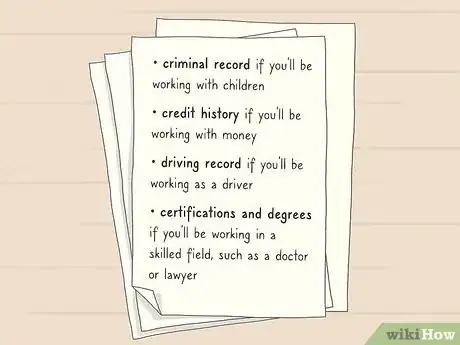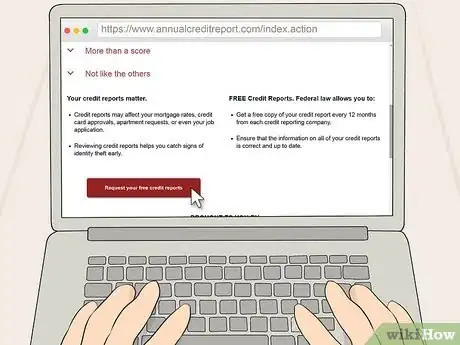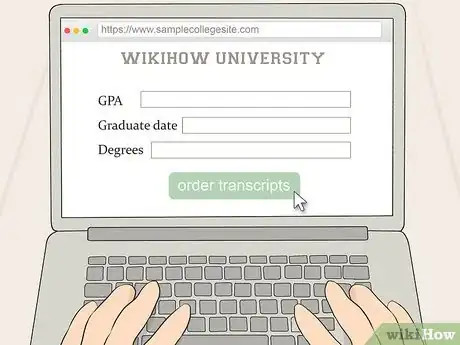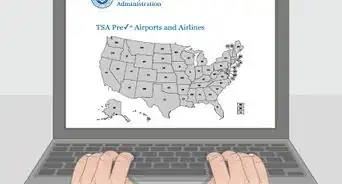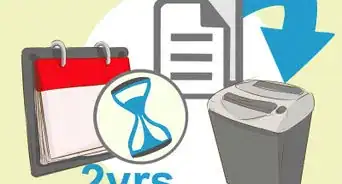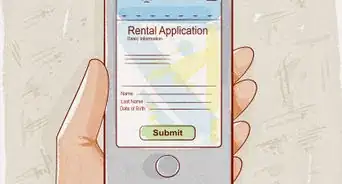This article was co-authored by Michael McCutcheon, PhD. Dr. Michael McCutcheon is a career coach, psychologist, and award-winning public speaker who specializes in procrastination elimination, goal achievement, and increasing life satisfaction. With a background as a counseling psychologist, he guides clients toward becoming more aware of their desires and anxieties to break old patterns, create new habits, and achieve life-changing results. He also helps clients improve organization skills, embark on a new career, get promoted, get admitted into graduate schools, and transition from school to the working world. He is a published author and lecturer in graduate psychology courses at New York University (NYU), a position he has twice won the Teaching Award (2014 & 2019). His work has appeared in the press as a lifestyle and career expert for The Washington Post/The Associated Press, The New York Post, Scholastic, Lifehacker, and The Coca-Cola Company. He has served as a contributing writer for Out Magazine and featured panelist on National Public Radio (NPR).
There are 10 references cited in this article, which can be found at the bottom of the page.
This article has been viewed 17,997 times.
Background checks are a common requirement when applying to certain jobs, such as in healthcare, childcare, and finance. However, some employers may do them as a routine screening for all of their job candidates. If you are applying for a job that requires a background check, running one on yourself first is a smart move. If anything is inaccurate, you can dispute it. You can also prepare what you’ll say to explain anything on your record that is accurate.
Steps
Collecting the Information
-
1Find out what checks will be required if you’re applying for a job. The amount of information that an employer might look for in a background check will depend on the type of job and what your responsibilities might be.[1] Check the job posting or ask the human resources manager what kind of background checks they will be running so you can check yourself out first. Some examples of things the employer might be looking for include your:[2]
- Criminal record if you’ll be working with children
- Credit history if you’ll be working with money
- Driving record if you’ll be working as a driver
- Certifications and degrees if you’ll be working in a skilled field, such as a doctor or lawyer
-
2Contact your local police department for a criminal background check. If your potential employer will be checking your criminal record and you’d like to know what they will find, you can order a criminal record from your local police department. This is usually available for a small fee, but it may be worth it if there is something on your record that you may need to explain to potential employers.[3]
- For example, if you live in Tennessee, you can obtain a background check that will include your criminal history in that state for $29.00.[4]
Advertisement -
3Get a federal criminal record from the FBI for a more thorough record. This will provide a federal and state criminal record as well as whether you are on a sex offender list. This may be preferable if you’ve lived in different states or if you’re applying for a job that requires you to prove you are not on a sex offender list, such as a job in childcare.[5]
- You’ll be required to get fingerprints for an FBI background check.
-
4Visit the department of motor vehicles for a driving record. If the job you’re applying for involves driving, they may check your driving record to look for things like traffic violations, speeding tickets, and DUIs. To obtain this information yourself, visit your local department of motor vehicles or log onto their website and request a copy of your driving record.
- You may have to pay a small fee to obtain the information. For example, the California DMV charges $2.00 for a digital copy of your driving record or $5.00 for a paper copy.[6]
-
5Order a free credit report from a reputable website. You are entitled to a free annual credit report from each of the three main credit reporting agencies, which include Experian, TransUnion, and Equifax. If you will be working in a position that involves money, then your employer will likely check your credit. Your credit report includes information on your debts, payments, credit history, applications for credit, and outstanding balances.[7]
- You can obtain all three of your credit reports at once by visiting the Annual Credit Report website: https://www.annualcreditreport.com/index.action
-
6Contact any institutions you graduated from to order transcripts. Your potential employer may require you to submit transcripts as proof of your GPA, graduate date, and degrees obtained. You can easily obtain these through your high school, trade school, or college’s website. However, in some cases you may need to call or submit a paper request for the information.[8]
- Getting your transcripts may also be helpful for you when you fill out your application, since it will ensure that all of the details you include in it are correct.
-
7Confirm your previous employment details with former employers. A potential employer may contact your former employers to confirm any details that you give them. This may include your job titles, pay rate, raises, hire date, and responsibilities.[9] If you are unsure about any of these details, contact the human resources manager at your previous employers to confirm them.[10]
- For example, you could call or email the human resources manager, and say something like, “Hello! I am a former employee and I need to confirm some of my employment details for a job application. Can you please tell me my exact hire date, starting pay rate, ending pay rate, and job title?”
-
8Search the internet to see what comes up under your name. This is an easy way to check up on your social media presence and find out if anything that comes up might be undesirable for applying to jobs. Try searching for your name on Google and on social media websites to see what comes up. If there’s anything that you’d prefer a potential employer did not see, delete it.[11]
- For example, if a quick search turns up a series of social media posts that reflect your strong political views and you think your employer might disapprove, delete these.
- Or, if the search turns up pictures of you drinking alcohol or engaging in other behavior that your potential employer might not like, delete these photos.
Tip: If you anticipate a thorough background check from a potential employer, you may consider hiring someone to run a background check on you or paying for a background check from a reputable website. This will be more expensive than gathering the information yourself, but it will also save you time.
Using the Information
-
1Review the information you gather to check for accuracy. Read through all of the documents you gather for your self-background check to see if the information is correct. If anything is incorrect, you can contact the organization responsible for the records to dispute it. In some cases, this may even help you to spot identify theft.[12]
- For example, if there is a credit card listed on your credit check that you did not open, then this may be the result of someone using your information. Contact the credit card company to alert them that you did not open that card.
-
2Dispute or correct any false information on the check. If you find anything that is false in your review of the documents you gathered, contact the responsible agency and tell them the information is incorrect. They may be able to fix the issue by double-checking their records.[13]
- For example, if your academic transcript gives the wrong graduation date, then call the university to alert them to this error and request that they fix it.
- Or, if your driving record includes a speeding ticket that you were found not guilty of after disputing it in court, contact the DMV and ask them to remove this from your record.
-
3Hire a lawyer to have information expunged from your record. In some cases you may be able to get certain details on your criminal record expunged or removed. The rules vary by state for what crimes are eligible to be expunged from your record, so you’ll have to research the laws in your state to determine if this is an option for you. The benefit of having your criminal record expunged is that you will no longer have to disclose it.[14]
- Be aware that any expunged crimes may still be included in your criminal record, but listed as expunged.
- Crimes that can be expunged are typically minor, non-violent crimes, such as petty theft.
- You may also be able to get your juvenile record expunged in some cases.
Tip: Some companies require potential employees to obtain a background check on themselves to be considered for employment. If you have been instructed to do this, find out if the employer needs the original documents or a copy and submit it to them as instructed.[15]
References
- ↑ Michael McCutcheon, PhD. Career Coach & Psychologist. Expert Interview. 24 February 2021.
- ↑ https://www.marketwatch.com/story/looking-for-a-job-brace-yourself-for-very-invasive-background-checks-2017-06-28
- ↑ https://thelawdictionary.org/article/how-to-order-a-criminal-background-check-on-yourself/
- ↑ https://www.tn.gov/tbi/divisions/cjis-division/background-checks.html
- ↑ https://thelawdictionary.org/article/how-to-order-a-criminal-background-check-on-yourself/
- ↑ https://www.dmv.ca.gov/portal/dmv/detail/online/dr/dr_faqs
- ↑ https://www.usa.gov/credit-reports
- ↑ https://www.goodhire.com/blog/how-to-run-a-background-check-on-yourself
- ↑ Michael McCutcheon, PhD. Career Coach & Psychologist. Expert Interview. 24 February 2021.
- ↑ https://www.goodhire.com/blog/how-to-run-a-background-check-on-yourself
- ↑ https://zety.com/blog/check-your-online-presence
- ↑ https://thelawdictionary.org/article/how-to-order-a-criminal-background-check-on-yourself/
- ↑ https://www.goodhire.com/blog/how-to-run-a-background-check-on-yourself
- ↑ https://www.nolo.com/legal-encyclopedia/expungement-of-criminal-records-basics-32641.html
- ↑ https://www.gov.uk/criminal-record-checks-apply-role
